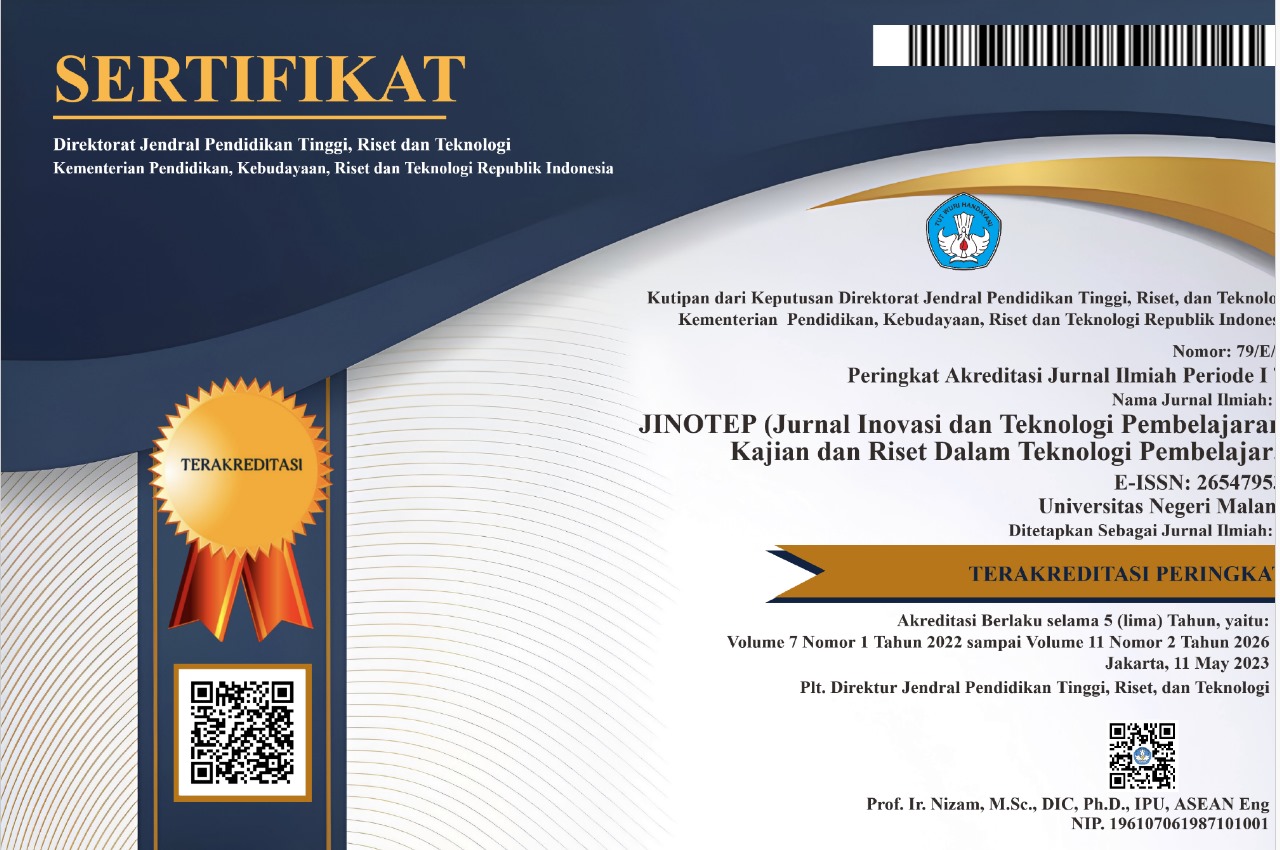Project-Based Learning Model to Improve Student's Hands and Feet Motor Skills in Rhythmic Gymnastics
Abstract
Abstrak: Kurangnya pengetahuan dan kemampuan siswa dalam gerakan tangan dan kaki dasar senam ritmik adalah kekuatan pendorong di balik penelitian ini. Tujuan dari penelitian ini adalah untuk menguji bagaimana pendekatan pembelajaran berbasis proyek mempengaruhi keterampilan motorik siswa untuk gerak kaki dan gerak tangan senam ritmik. Penelitian ini menggunakan prosedur kuasi-eksperimental. Alat yang digunakan adalah tes senam ritmik yang mengevaluasi gerakan tangan dan kaki. Populasi penelitian adalah siswa kelas XI SMA PGRI 1 Majalengka berjumlah 50 siswa. Purposive sampling digunakan untuk mendapatkan 25 sampel. Berdasarkan pengolahan dan analisis data, rata-rata hasil tes awal adalah 15,93, dan rata-rata hasil tes akhir adalah 18,86. Hal ini diperkuat dengan hasil analisis data yang menunjukkan bahwa thitung 7,89 lebih tinggi dari ttabel 2,14. Kontribusi penelitian ini menyimpulkan bahwa pendekatan pembelajaran berbasis proyek dapat membantu keterampilan motorik siswa.
Abstract: Lack of knowledge and proficiency among students in rhythmic gymnastics' fundamental hand and foot movements is the driving force behind this study. The goal of this study is to examine how a project-based learning approach affects students' motor skills for rhythmic gymnastic footwork and hand movements. This study employed a quasi-experimental procedure. The tool utilized is a rhythmic gymnastics test that evaluates hand and foot motions. There are 50 students in class XI at SMA PGRI 1 Majalengka as population. Purposive sampling was used to get 25 samples. According to data processing and analysis, the average initial test result was 15.93, and the average final test result was 18.86. This is collaborated by the data analysis results, which showed that tcount 7.89 is higher than ttable 2.14. The contribution of this research concludes that a project-based learning approach can help students' motor skills.
Keywords
Full Text:
PDFReferences
Ai, E. (2018). Pembinaan senam aerobik dalam upaya meningkatkan kebugaran jasmani masyarakat Pondok Pinang Lubuk Buaya Kecamatan Koto Tangah Kota Padang. International Journal of Community Service Learning, 2(4), 225–236. https://doi.org/10.23887/ijcsl.v2i4.15479
Almulla, M. A. (2020). The effectiveness of the project-based learning (pbl) approach as a way to engage students in learning. SAGE Open, 10(3). https://doi.org/10.1177/2158244020938702
Araki, T., Miyauchi, M., Suzaki, M., Wakakuri, T., Kirinoki, S., Onodera, N., Saigusa, T., Takana, A., Hyodo, H., Ohara, T., Kawai, M., Yasutake, M., & Yokota, H. (2016). Gymnastic formation-related injury to children in physical education. Journal of Nippon Medical School, 82(6), 295–299. https://doi.org/10.1272/-jnms.82.295
Asad, M., Iqbal, K., & Sabir, M. (2015). Effectiveness of problem based learning as a strategy to foster problem solving and critical reasoning skills among medical students. Journal of Ayub Medical College, Abbottabad : JAMC, 27(3), 604–607
Barron, B. J. S., Schwartz, D. L., Vye, N. J., Moore, A., Petrosino, A., Zech, L., & Bransford, J. D. (1998). Doing with understanding: lessons from research on problem- and project-based learning. Journal of the Learning Sciences, 7(3–4), 271–311. https://doi.org/10.1080/10508406.1998.9672056
Bell, S. (2010). Project-Based Learning for the 21st Century: Skills for the future. The Clearing House: A Journal of Educational Strategies, Issues and Ideas, 83(2), 39–43. https://doi.org/10.1080/00098650-903505415
Bilgin, I., Karakuyu, Y., & Ay, Y. (2015). The effects of project based learning on undergraduate students’ achievement and self-efficacy beliefs towards science teaching. Eurasia Journal of Mathematics, Science and Technology Education, 11(3), 469–477. https://doi.org/10.12973/eurasia.2014.1015a
Casey, A., & MacPhail, A. (2018). Adopting a models-based approach to teaching physical education. Physical Education and Sport Pedagogy, 23(3), 294–310. https://doi.org/10.1080/17408989.2018.1429588
Chen, J., Kolmos, A., & Du, X. (2021). Forms of implementation and challenges of PBL in engineering education: a review of literature. European Journal of Engineering Education, 46(1), 90–115. https://doi.org/10.1080/03043797.2020.1718615
Daar, G., & Nasar, I. (2021). Teachers challenges in the learning process during the covid-19 pandemic in rural areas. JINOTEP (Jurnal Inovasi Dan Teknologi Pembelajaran): Kajian Dan Riset Dalam Teknologi Pembelajaran, 8(2), 186–193. https://doi.org/10.17977/um031v8i22021p186
DeCuir–Gunby, J. T. (2011). Mixed methods research in the social sciences. Best Practices in Quantitative Methods, 125–136. https://doi.org/10.4135/9781412995627.d11
Edmunds, J., Arshavsky, N., Glennie, E., Charles, K., & Rice, O. (2017). The relationship between project-based learning and rigor in STEM-focused high schools. Interdisciplinary Journal of Problem-Based Learning, 11(1), 1–6. https://doi.org/10.7771/1541-5015.1618
Febriyanti, F., Jayadi, I., & Wiriawan, O. (2018). Tingkat kondisi fisik member senam aerobik di sanggar “Gleonov Gym.” JSES : Journal of Sport and Exercise Science, 1(1), 08. https://doi.org/10.26740/jses.-v1n1.p08-12
Fernhall, B., Borghi-Silva, A., & Babu, A. S. (2015). The future of physical activity research: funding, opportunities and challenges. Progress in Cardiovascular Diseases, 57(4), 299–305. https://doi.org/-10.1016/j.pcad.2014.09.003
Haatainen, O., & Aksela, M. (2021). Project-based learning in integrated science education: Active teachers’ perceptions and practices. Lumat, 9(1), 149–173. https://doi.org/10.31129/LUMAT.9.1.1392
Hasni, A., Bousadra, F., Belletête, V., Benabdallah, A., Nicole, M. C., & Dumais, N. (2016). Trends in research on project-based science and technology teaching and learning at K–12 levels: a systematic review. Studies in Science Education, 52(2), 199–231. https://doi.org/10.1080/03057267.2016.1226573
Huysken, K., Olivey, H., McElmurry, K., Gao, M., & Avis, P. (2019). Assessing collaborative, project-based learning models in introductory science courses. Journal of the Scholarship of Teaching and Learning, 19(1), 6–28. https://doi.org/10.14434/josotl.v19i1.26777
Indrawathi, N. L. P. (2020). Perbedaan pengaruh latihan senam aerobik low impact dan mix impact terhadap tingkat kesegaran jasmani pada mahasiswa Fakultas Pendidikan Olahraga Dan Kesehatan (FPOK) IKIP PGRI Bali Tahun Pelajaran 2015. Jurnal Pendidikan Kesehatan Rekreasi, 1(2), 274–282.
Indrayogi, I. (2021). Model Tactical game dan academic learning time dalam pembelajaran pendidikan jasmani. Jurnal Educatio FKIP UNMA, 7(4), 1783–1790. https://doi.org/10.31949/educatio.v7i4.1589
Indrayogi, I., Nurhayati, M., & Fauzi, R. S. (2021). Physical fitness and attention level of elementary school students. Malaysian Journal of Medicine and Health Sciences, 17(5), 142–145.
Issa, G., Hussain, S. M., & Al-Bahadili, H. (2014). Competition-based learning: A model for the integration of competitions with project-based learning using open source LMS. International Journal of Information and Communication Technology Education, 10(1), 1–13. https://doi.org/10.4018/ijicte.2014010101
Juliantine, T., Rohmah, O., Komariyah, L., Gumilar, A., & Hambali, B. (2020). Project-based learning model in the development of students’ creativity in physical education learning. In 4th International Conference on Sport Science, Health, and Physical Education (ICSSHPE 2019) , 324–326. https://doi.org/10.2991/-ahsr.k.200214.086
Kizkapan, O., & Bektas, O. (2017). The effect of project based learning on seventh grade students’ academic achievement. International Journal of Instruction, 10(1), 37–54. https://doi.org/10.12973/iji.2017.-1013a
Lazić, B. D., Knežević, J. B., & Maričić, S. M. (2021). The influence of project-based learning on student achievement in elementary mathematics education. South African Journal of Education, 41(3), 1–10. https://doi.org/10.15700/saje.v41n3a1909
Listyarini, A. E. (2015). Latihan senam aerobik untuk meningkatkan kebugaran jasmani. Medikora, VIII(2). https://doi.org/10.21831/medikora.v0i2.4654
Masek, A., & Yamin, S. (2011). The effect of problem based learning on critical thinking ability: a theoretical and empirical review. International Review of Social Sciences and Humanities, 2(1), 215–221. www.irssh.com
Masyn, K. E. (2013). The Oxford Handbook of Quantitative Methods, Volume 2. In Oxford Library of Psychology (Vol. 2).
Mayasari, T., Kadarohman, A., Rusdiana, D., & Kaniawati, I. (2016). Apakah model pembelajaran problem based learning dan project based learning mampu melatihkan keterampilan abad 21? Jurnal Pendidikan Fisika Dan Keilmuan (JPFK), 2(1), 48. https://doi.org/10.25273/jpfk.v2i1.24
Mioduser, D., & Betzer, N. (2008). The contribution of project-based-learning to high-achievers’ acquisition of technological knowledge and skills. International Journal of Technology and Design Education, 18(1), 59–77. https://doi.org/10.1007/s10798-006-9010-4
Nugraha, H., Rusmana, A., Khadijah, U., & Gemiharto, I. (2021). Microlearning sebagai upaya dalam menghadapi dampak pandemi pada proses pembelajaran. JINOTEP (Jurnal Inovasi Dan Teknologi Pembelajaran): Kajian Dan Riset Dalam Teknologi Pembelajaran, 8(3), 225–236. https://doi.org/10.17977/um031v8i32021p225
Nyberg, G., & Larsson, H. (2014). Exploring “what” to learn in physical education. Physical Education and Sport Pedagogy, 19(2), 123–135. https://doi.org/10.1080/17408989.2012.726982
Ocak, M. A., & Uluyol, Ç. (2010). Investigation of college students’ intrinsic motivation in project based learning. International Journal of Human Sciences, 7(January), 1152–1169.
Oriza Candra, E. a. (2021). The development of aflexibility-project based learning model on vocational education: A need analysis. Turkish Journal of Computer and Mathematics Education (TURCOMAT), 12(3), 2782–2786. https://doi.org/10.17762/turcomat.v12i3.1307
Quennerstedt, M. (2019). Physical education and the art of teaching: transformative learning and teaching in physical education and sports pedagogy. Sport, Education and Society, 24(6), 611–623. https://doi.org/10.1080/13573322.2019.1574731
Rosidah, N. (2013). Perbedaan pengaruh latihan senam aerobik low impact dan mix impact terhadap tingkat kesegaran jasmani pada siswa putri SMK Negeri 1 Surakarta tahun pelajaran 2012/2013. Phederal: Physical Education, Health and Recreation Journal, 1(1).
Sano, T., & Kokudo, S. (2017). Examination of movement patterns that reflect the proficiency level in straddle vault for elementary school children. Science of Gymnastics Journal, 14(1), 29–44. https://doi.org/10.52165/sgj.14.1.29-44
Siska, A. (2020). Pengaruh latihan senam aerobik terhadap penurunan berat badan, persentase lemak tubuh dan peningkatan massa otot. Jurnal Sporta Saintika, 47(3), 219–233.
Ulfah, A. A., Dimyati, D., & Putra, A. J. A. (2021). Analisis penerapan senam irama dalam meningkatkan kemampuan motorik kasar anak usia dini. Jurnal Obsesi : Jurnal Pendidikan Anak Usia Dini, 5(2), 1844–1852. https://doi.org/10.31004/obsesi.v5i2.993
Ulya, F., Rifai RC, A., & Sulistyorini, S. (2020). The effectiveness of project-based learning model and talking sticktype of cooperative learning model on the quran-hadith subject learning outcomes. Innovative Journal of Curriculum and Educational Technology, 9(2), 87–93. https://doi.org/10.15294/ijcet.v9i2.-40173
Umam, H. I., & Jiddiyyah, S. H. (2020). Pengaruh pembelajaran berbasis proyek terhadap keterampilan berpikir kreatif ilmiah sebagai salah satu keterampilan abad 21. Jurnal Basicedu, 5(1), 350–356. https://doi.org/10.31004/basicedu.v5i1.645
Veselov, G. E., Pljonkin, A. P., & Fedotova, A. Y. (2019). Project-based learning as an effective method in education. ACM International Conference Proceeding Series, 54–57. https://doi.org/10.1145/-3341042.3341046
Yasue, M., Ueda, T., Fukuda, T., Adachi, T., & Ozaki, Y. (2019). The difference between movement and self-recognition in children performing the standing long jump. Global Pediatric Health, 6. https://doi.org/10.1177/2333794X19890767
DOI: http://dx.doi.org/10.17977/um031v9i32022p240
Refbacks
- There are currently no refbacks.
Copyright (c) 2022 Indrayogi Indrayogi, Maya Nurhayati, Riza Sukma Fauzi

This work is licensed under a Creative Commons Attribution-ShareAlike 4.0 International License.
======================================================================
Jurnal Inovasi dan Teknologi Pembelajaran published by Universitas Negeri Malang in collaboration with the Asosiasi Program Studi Teknologi Pendidikan Indonesia (APS TPI) and Ikatan Profesi Teknologi Pendidikan Indonesia (IPTPI) with a MoU.
Publisher Address:
Educational Technology Laboratorium, Building D5, 1st Floor
Faculty of Education, Universitas Negeri Malang
Semarang St. No. 5, Malang City, East Java Province, Postal Code 65145
Email: jinotep.fip@um.ac.id
======================================================================

JINOTEP is licensed under a Creative Commons Attribution-ShareAlike 4.0 International License.
JINOTEP Statistics (Since July 13th, 2020)



.png)




.png)
1.png)
1.png)
4.png)
2.png)
1.png)
1.png)
.png)


_3.png)





1.png)
.png)